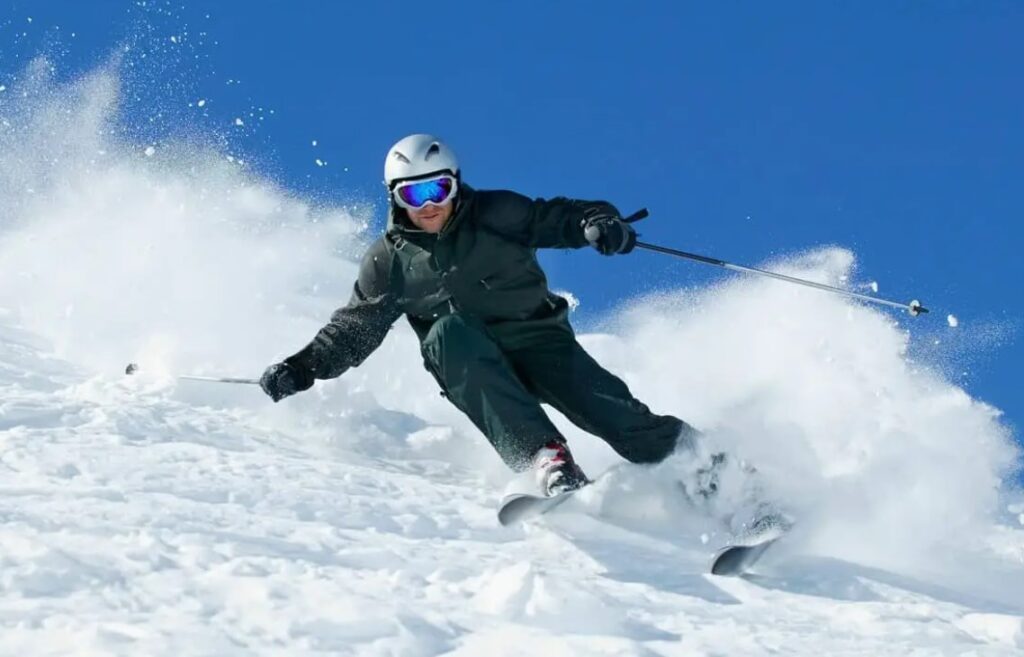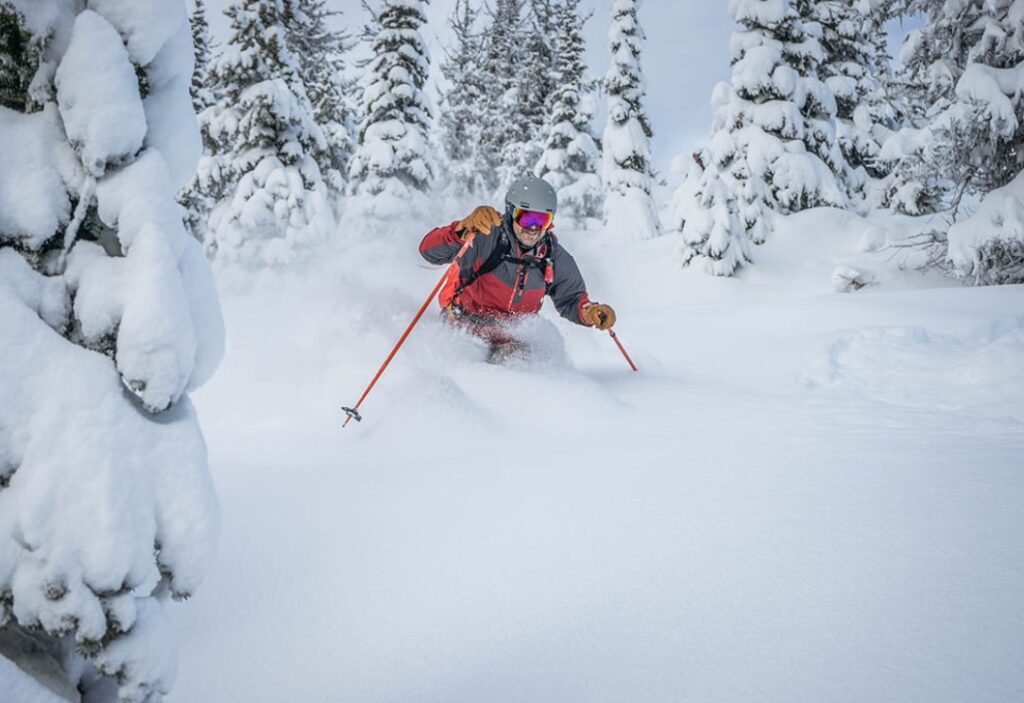Can I Wear A Bike Helmet For Skiing? Answered
Are you looking for Can I Wear A Bike Helmet For Skiing? The question of whether a bike helmet is suitable for skiing is a common one among outdoor enthusiasts. Here, we delve into the specifics of using a bike helmet for skiing.
Key Takeaways
- Bike and ski helmets are designed for different impact types.
- Ski helmets have specific features for cold weather.
- Safety standards for ski and bike helmets differ.
- Comfort and fit vary between the two helmet types.
Can I Wear A Bike Helmet For Skiing?
No, it’s not recommended to wear a bike helmet for skiing. Bike helmets and ski helmets are designed for different purposes, with ski helmets specifically tailored to provide the appropriate protection, insulation, and features necessary for the conditions and types of impacts encountered in skiing.

Helmet Design Differences
Structure and Material
Bike helmets, typically lighter, are designed for warmer conditions. They offer ventilation, crucial for cycling but less so for skiing. Ski helmets, on the other hand, are built for colder environments. They feature insulation and reduced ventilation, crucial for retaining heat.
Impact Protection
Skiing and cycling accidents differ in nature. Ski helmets are built to withstand multiple low-force impacts, common in skiing falls. Bike helmets, conversely, are designed for single high-impact collisions. This fundamental difference is crucial in understanding why a bike helmet may not be the best choice for skiing.
Safety Standards
Certification and Testing
Ski and bike helmets undergo different safety tests. Ski helmets must meet specific cold-weather impact standards. Bike helmets, tested for different scenarios, might not provide adequate protection in ski-related accidents.
Compliance with Regulations
Using a bike helmet for skiing might not comply with local regulations. Some ski resorts mandate helmets that meet specific ski safety standards, which bike helmets may not fulfill.
Comfort and Fit
Adjustability and Comfort
Bike helmets often offer more adjustability, catering to the diverse needs of cyclists. Ski helmets, designed for colder conditions, prioritize insulation and might be less adjustable but more comfortable in cold weather.
Size and Weight
The size and weight of ski helmets are generally more conducive to the bulky winter gear worn by skiers. Bike helmets, lighter and more compact, might not fit as well with ski goggles and winter headwear.
Visibility and Hearing

Field of Vision
Ski helmets are designed to work seamlessly with ski goggles, providing a wide field of vision. Bike helmets may not accommodate ski goggles as effectively, potentially limiting visibility on the slopes.
Hearing Capabilities
Ski helmets often feature ear coverage that balances protection with the ability to hear one’s surroundings, crucial for safety on ski slopes. Bike helmets, optimized for different conditions, may not offer this balance.
Temperature and Weather Conditions
Insulation and Warmth
The insulation in ski helmets is key for comfort in cold, windy, and snowy conditions. Bike helmets, with their ventilation systems, might not provide enough warmth on the slopes.
Weather Resistance
Ski helmets are designed to handle snowy and wet conditions, with features like water-resistant materials. Bike helmets, while weather-resistant, may not offer the same level of protection in ski-specific weather conditions.
What Is The Difference Between A Ski Helmet And A Cycling Helmet?
The primary difference between ski helmets and cycling helmets lies in their design, intended use, and safety features. Ski helmets are built to withstand multiple, lower-impact collisions typical in skiing, where falls are more frequent but often less severe.
They also provide better insulation to cope with cold weather conditions and are compatible with ski goggles. Features like ear coverage and reduced ventilation are specific to ski helmets, and aimed at keeping the wearer warm and comfortable in snowy environments.

Cycling helmets, on the other hand, are designed for single, high-impact collisions. They offer more ventilation to keep the rider cool in warmer weather and are generally lighter than ski helmets. The aerodynamic design of cycling helmets is tailored for biking speeds and conditions, which differ significantly from skiing scenarios.
In summary, the main differences revolve around the impact protection suitable for each sport, temperature regulation, compatibility with other gear (like goggles), and the overall design catering to the specific conditions of skiing or cycling.
Can You Wear A BMX Helmet For Skiing?
Technically, you can wear a BMX helmet for skiing, but it is not advisable due to several reasons. BMX helmets are designed for biking, with an emphasis on protecting against high-impact crashes. While this might seem beneficial, these helmets lack several key features necessary for skiing safety and comfort.
They do not provide the same level of insulation as ski helmets, which is crucial in cold, snowy environments. Also, BMX helmets often lack the coverage and compatibility with ski goggles that are essential for skiing.

Moreover, the difference in safety standards is a significant concern. BMX helmets are not tested for the same types of impacts and conditions as ski helmets. Wearing a BMX helmet while skiing could compromise your safety and may not comply with the safety regulations of many ski resorts.
In conclusion, while a BMX helmet can be physically worn while skiing, it does not offer the appropriate protection, features, or comfort required for the sport.
Can You Wear Bike Helmet On Ice?
Wearing a bike helmet on ice, such as when ice skating or playing ice hockey, is possible, but it is not the optimal choice. Bike helmets are designed to protect against the types of impacts experienced in cycling, which are different from those you might encounter on ice.
Ice-related falls typically involve multiple low-force impacts, for which ice-skating or hockey helmets are specifically designed. These helmets offer features like increased side protection and coverage at the back of the head, which are crucial in ice sports.
Another important aspect is temperature regulation. Bike helmets are designed for ventilation and cooling, which is not ideal for ice environments. Helmets designed for ice sports usually have better insulation to keep the head warm.
Lastly, bike helmets might not provide the correct fit and coverage when worn with additional ice sports gear, such as face masks or ear protectors, which are common in ice sports for added safety.
While bike helmets provide some level of protection and could be used temporarily, it is always recommended to use sport-specific helmets for better safety and comfort.
Conclusion
In conclusion, while you can technically wear a bike helmet for skiing, it is not the best choice. So, Can I wear a bike helmet for skiing? Yes, but it’s not advisable.
Ski helmets are specifically designed for the conditions and risks associated with skiing. They offer better insulation, visibility, and protection suitable for the sport. For your safety and comfort, investing in a proper ski helmet is recommended.
Top FAQ’s
How often should ski helmets be replaced?
Ski helmets should be replaced every 3-5 years or immediately after a significant impact. Over time, the materials can degrade, especially if the helmet is exposed to extreme temperatures or sunlight, reducing its effectiveness in protecting the head.
What should I look for when purchasing a ski helmet?
When purchasing a ski helmet, look for one that fits snugly but comfortably, is compatible with your ski goggles, meets safety standards (like ASTM or CEN), and has adequate insulation. Additional features like adjustable vents, removable liners, and ear pads might be beneficial.
Can a ski helmet be used for other winter sports?
Yes, ski helmets can often be used for other winter sports such as snowboarding. They are designed to provide the protection and insulation needed for various activities in cold and snowy environments.
Are ski helmets more expensive than bike helmets?
The price of ski helmets can vary, and they might be more expensive than some bike helmets due to their specialized features for cold weather and impact resistance. However, prices vary widely based on brand, model, and features.

Welcome to the exhilarating world of Matt Rex, a professional car racer turned renowned vehicle enthusiast. Immerse yourself in his captivating blog as he shares heart-pounding adventures, expert reviews, and valuable insights on cars, trucks, jets, and more. Fuel your passion for speed and discover the beauty of vehicles through Matt’s engaging stories and meticulous expertise. Join the ever-growing community of enthusiasts who find inspiration and expert advice in Matt Rex’s blog—a digital hub where the thrill of speed meets the pursuit of knowledge.







